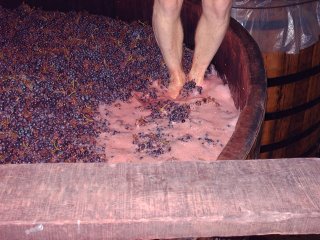Last night we had a table of four regular customers in for dinner. They are a nice pair of couples who are become more regular as time goes on. The guys like their wines, mainly Burgundy, red naturally, but good champagne too. Ive hooked them up recently with Jacquesson Cuvee 729, which they are loving. They have got to the stage where they are comfortable to leave the choice of wine to me, I know what they like and how much they are prepared to pay.
As I may have mentioned we have a huge surplus of Grand Cru burgundy, so here was a perfect opportunity to shift a couple of bottles, and better yet, to someone who will appreciate it. So it was that our lucky guests got their opportunity to have this great wine at a considerably better price than it is usually listed for (£160 on the list). As they usually drink Nuits St Georges or Gevrey Chambertin it is in a similar style to the kind of wines they like.
Charles Rousseau took over running the domaine after a tragic car accident killed his father Armand in 1959. Since then he has considerably increased the domaines holdings in predominantly Grand Cru and Premier Cru vineyards based around Gevrey Chambertin. They work with some pretty old vines, the average age in his Chambertin holdings is sixty years old. The age of the vines means they only produce a small amount of fruit, but usually of a much superior quality. Another advantage to the age is that Charles never has to conduct a "green harvest". Further to the low yields they practice a severe triage of the fruit back at the cuverie to further eliminate any below-par fruit. All these measures contribute to some seriously low volumes, but luckily the quality of the wines speak for themselves and as such demand is always high.
Charles believes in partially destemming the fruit, as too much stem in the vats brings out unripe tannins and astringent characters into the wine. But by having about 20% stems you allow some aeration in the vats allowing the ferment to be more even through the vat and preventing hot-spots which can add uneven flavours to the finished wine. Perhaps unusually for Burgundy, Rousseau uses stainless steel vats to ferment the wines, with twice daily pigeage (punching down the skins to release colour) and remontage (pumping over the juice from the bottom of the vat, again to break up the cap and allow leaching of the colour. There is some debate as to the amount of oxidisation of the wine this may cause). After about two weeks the wines are pumped into a fresh vat or into 100% new Alliers oak, for anything upto 18 months.
There is no mistaking the fact that these are serious wines. The labels are very classically simple with an almost monkish script that lends the right amount of gravitas to the wines.

Clos de la Roche is the one of the Grand Cru leiu-dits of Morey-St-Denis. Actually the largest of the Grand Cru climats of Morey, it encompasses nearly 17 hectares, producing somewhere in the region of 70000 bottles. It is at an elevation of about 300 metres with a definate east facing aspect which draws pretty much the maximum amount of sunlight possible. It is often said it is the more classy of the grand crus of Morey. With its seductive aromas of deep violets, myrtille and a hint of truffle to it, all interlaced with a kind of foresty cherry aroma, this wine draws you in caresses your palate with an elegance of intensity. Imagine that relaxing feeling you feel washing over you as you slip into a hot bath, letting your muscles go and relaxing. Thats how you feel after sipping this wine. That contented "Ahhhhhhhh!!!!" rushing over your tongue and down the back of your throat. It can be a dangerous thing though. When a wine slips down that easily and so smoothly, you soon drink the whole bottle. Or two, and thats when things can get expensive. Unless you're on good terms with your sommelier!!
When I was in Burgundy last year, Bernard (Vallet) took us past Domaine Armand Rousseau and there outside was Charles washing down his tractor. Bernard told us that they were related, but that wasnt really a surprise. The nature of Burgundy is that just about everyone there is related!






No comments:
Post a Comment